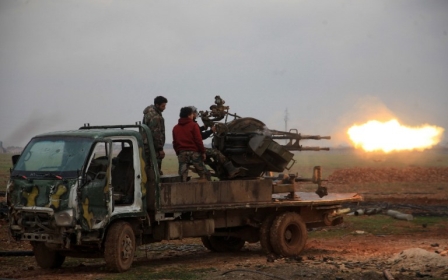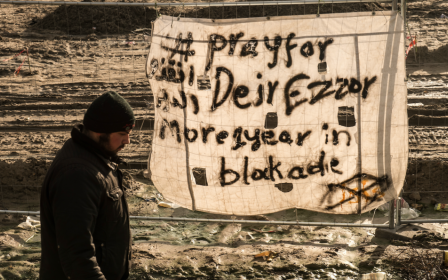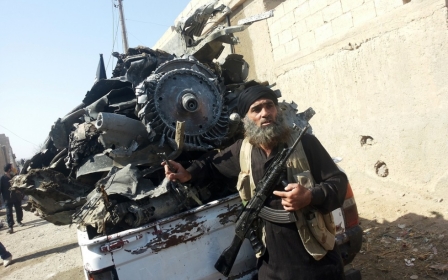Residents of east Syrian town attacked by IS fear 'massacre'

Residents of a Syrian city being overrun by Islamic State (IS) militants say they are terrified of a “massacre” if the group manages to extend its control.
Many also fear that the city's sparse food supplies could dry up amid a nearly year-long siege, after IS seized control of the only area used to produce and import food.
The IS assault on the eastern city of Deir Ezzor, the seventh largest in Syria, began on Saturday with a multi-front offensive, with dozens of fighters carrying out suicide bomb attacks as they stormed government positions.
At least 120 members of the government forces were killed in the attack, with local activists reporting that most of them had been executed by IS, and 400 civilians were captured. On Wednesday, IS, which is in control of 60 percent of the city, released 270 hostages.
Those released included the elderly, women and children under the age of 14, according to the British-based Syrian Observatory for Human Rights.
The group continues to hold 130 civilians, mostly teenagers and adult men, for questioning, the monitor said.
The most recent assault has intensified a siege that had already caused fear and hardship for the roughly 200,000 people still living inside.
Russia's Foreign Ministry said on Wednesday that it had airdropped 50 tonnes of humanitarian relief materials into the city, although it did not specify which items or over what time period.
The Russian military also said on Wednesday that it had launched a large-scale bombing campaign targeting IS in the city, hitting dozens of targets within a 24-hour period.
However, local activists allege that some of the strikes have hit non-military targets, leading to civilian deaths.
IS imposed a siege on four residential districts of the city in February 2015, with local activists reporting civilian deaths from starvation and malnutrition.
Around 70 percent of the city's remaining residents are women and children, according to the United Nations.
In an unverified clip circulating on social media on Wednesday, a purported resident of the city complained that there was “no water, no electricity, no firewood”.
“By God, our situation is hard," the resident is quoted as saying.
"People are afraid, conditions are very difficult," Attiyeh, another resident of Deir Ezzor, said by phone from the city.
"Food and vegetables are rare, and we're starting to have problems with bread," he added.
He said reports circulated by state media that IS fighters had killed 300 civilians in the city had sparked even more fear.
"If the city falls, there will be a massacre," Attiyeh said.
There have also been reports in the local press that people captured by the group had been forced to fight on pain of execution if they refused.
A source told local news site Deir Ezzor 24 that seven people sentenced to death after being captured by IS had not been executed, but were being forced to fight for the group in Iraq.
'Severe' shortages
Resident Ghaleb al-Haj Hamdo, 23, told AFP that explosions from nearby clashes could still be heard in the city on Wednesday afternoon.
"I am afraid of a massacre that will repeat itself over and over if Daesh invades our neighbourhood," Hamdo said by phone, using an Arabic acronym for IS.
Fearing fresh violence, residents are limiting their activities around the city at night, said the university student, who lives in the central al-Joura district.
The IS advance is just the latest encroachment on the city, where the government has clung to several neighbourhoods and the nearby military airport despite IS control of the rest of the province.
On Monday, IS consolidated its gains on the city's edges, taking advantage of a dust storm that all but grounded Russian warplanes that had been carrying out strikes in support of government troops, according to Observatory chief, Rami Abdel Rahman.
The most recent offensive "is putting thousands of people in the line of fire," said Linda Tom, spokeswoman for the UN's Office for the Coordination of Humanitarian Affairs, or OCHA.
"The UN has received credible reports of the execution and abduction/detention of civilians, including people believed to have been smuggling food into the besieged city," she told AFP by email.
In an update published just before the attacks, OCHA said landmines lined the roads leading out of Deir Ezzor and that a majority of inhabitants were surviving on bread and water.
The Syrian government airlifted basic supplies into the city on 11 January, and the Russian government said a few days later it had also dropped aid into besieged neighbourhoods.
Middle East Eye propose une couverture et une analyse indépendantes et incomparables du Moyen-Orient, de l’Afrique du Nord et d’autres régions du monde. Pour en savoir plus sur la reprise de ce contenu et les frais qui s’appliquent, veuillez remplir ce formulaire [en anglais]. Pour en savoir plus sur MEE, cliquez ici [en anglais].




